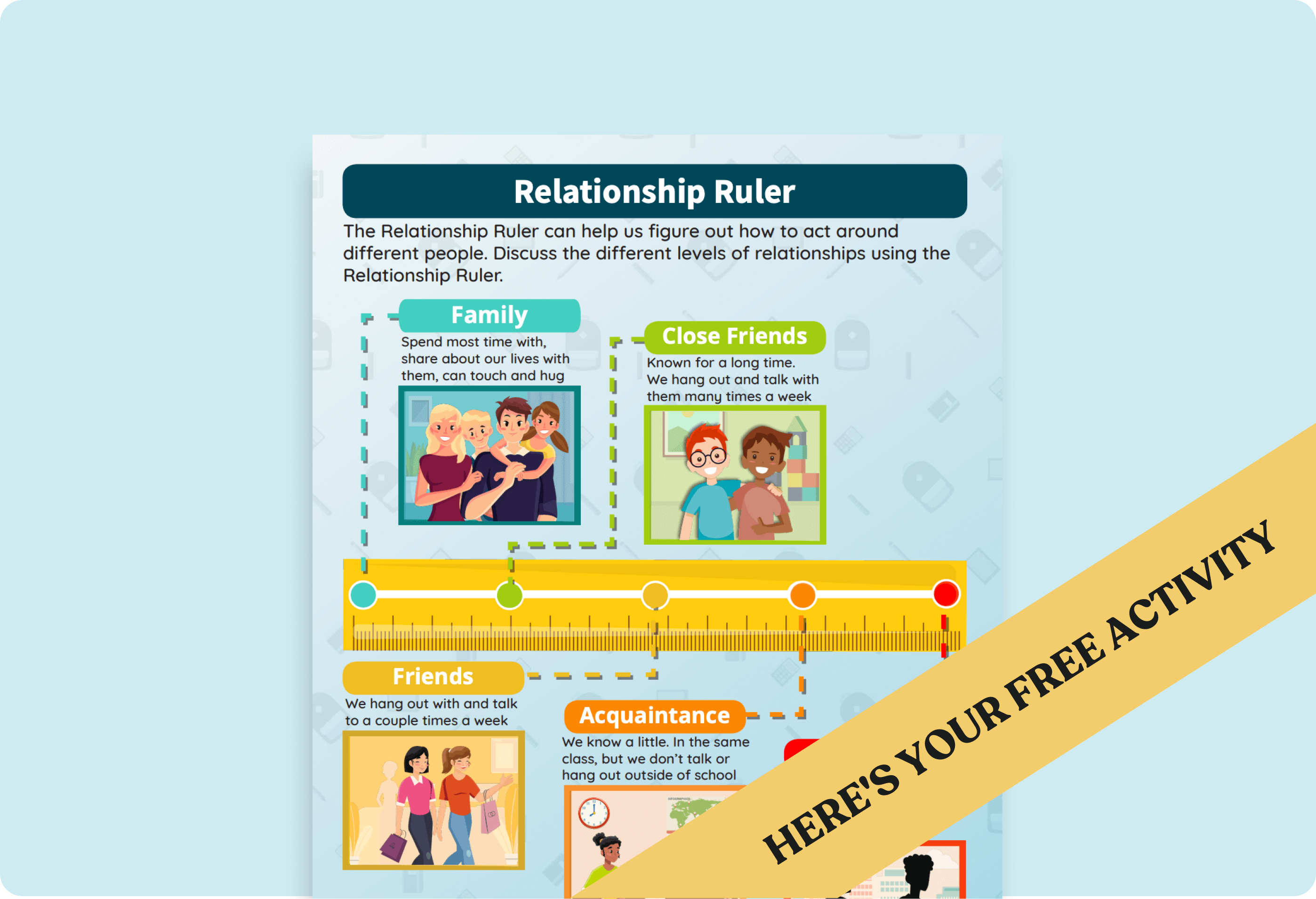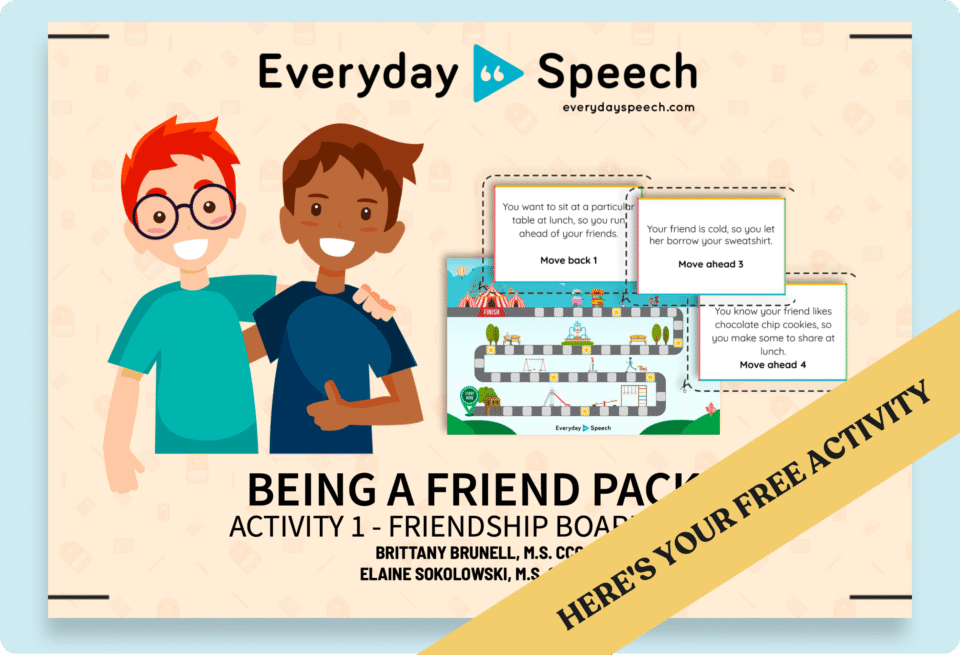Middle School Friendship Skills Activity: Relationship Ruler
Get free social skills materials
No-prep lessons on self-regulation, emotional recognition, conversation skills, and more.
Sign up hereStrong friendships play a central role in the lives of middle school students. Building, maintaining, and reflecting on these social connections can be challenging as students encounter new social dynamics, shifting group alliances, and increasing interpersonal complexity. School-based clinicians are often sought out to help students navigate these relationships successfully. The Relationship Ruler tool from Everyday Speech offers a concrete and engaging approach to help students develop critical friendship skills that lay a foundation for social resilience and well-being.
What Are Friendship Skills?
Get Free Activities for Friendship Skills
Printable lessons, games, posters, and interactive activities that teach essential friendship skills with zero prep required
Friendship skills refer to the social competencies that enable individuals to initiate, build, and maintain healthy, mutually satisfying friendships. In middle school, students are still learning how to communicate effectively, recognize healthy versus unhealthy relationship patterns, solve conflicts, and set personal boundaries. These skills include expressing empathy, choosing appropriate conversation topics, offering and accepting invitations, understanding the difference between acquaintances and close friends, and evaluating the health of current relationships.
Relationship skills go beyond simply having friends or participating in group activities. They encompass the ability to reflect upon the quality of connections, recognize when boundaries are respected or crossed, and take proactive steps to strengthen or reconsider relationships as needed. These abilities help students build social connections marked by trust, respect, and positive communication.
Why Teach Friendship Skills?
Developing friendship skills is a fundamental part of middle schoolers’ growth. Instruction and intentional practice provide students with the language, perspective, and tools they need to build and sustain healthy relationships. Some of the key reasons to explicitly teach these skills in a school setting include:
- Supporting social confidence in navigating complex peer scenarios
- Reducing incidences of social isolation or exclusion
- Promoting positive peer interactions and collaborative learning
- Providing strategies for managing disagreements or addressing unhealthy dynamics
- Teaching students self-advocacy in friendships
- Fostering resilience and coping strategies during interpersonal challenges
- Enhancing overall well-being and academic engagement
A supportive framework for friendship skill-building is especially meaningful in the middle grades, where peer influence is at its height and students begin to differentiate between superficial and supportive relationships.
Lesson Plan: Using Relationship Ruler
The Everyday Speech Relationship Ruler activity offers a practical way to help students assess and reflect on their friendships. This no-prep printable tool can be used individually or in small groups.
Download 30+ Printable Social Skills Posters
Ready-to-use visuals for emotional regulation, self-advocacy, and more
Below is a step-by-step lesson plan suggestion for implementing the Relationship Ruler with middle school students:
Step 1: Set the Purpose and Establish Group Guidelines
Begin by explaining that all friendships can be different, and it is helpful to reflect on how relationships make us feel. Share the purpose of the activity: to help students think about the health of their friendships and empower them to make thoughtful decisions about strengthening or improving them.
Foster a safe atmosphere by emphasizing confidentiality, mutual respect, and the voluntary nature of sharing. If working with a group or class, invite students to suggest ground rules for sensitive discussions.
Step 2: Introduce the Relationship Ruler
Show the Relationship Ruler printable to the group. Briefly describe how the ruler is used: it provides statements and checklists that measure how healthy or unhealthy a friendship feels. The tool guides students through rating aspects of a friendship and identifying actionable steps to improve relationship health.
Review the categories or questions included on the activity. Highlight items that relate to respect, trust, communication, enjoyment, and feeling supported. Clarify any vocabulary or concepts as needed.
Step 3: Guided Walkthrough and Modeling
Model the completion of the Relationship Ruler with an example—this could be a hypothetical friendship or a character from a book, movie, or television show familiar to the students. Go through each statement on the ruler, demonstrate rating the friendship, and verbalize what qualities make a friendship feel healthy or unhealthy.
Encourage students to consider factors like mutual respect, honesty, encouragement, boundaries, and how conflicts are handled. Validate that students may have a range of experiences and that relationships can CHANGE over time.
Step 4: Individual Reflection and Activity Completion
Invite students to choose a friendship from their life to reflect upon, keeping the specific identity confidential if desired. Distribute the Relationship Ruler worksheets and provide ample time for students to rate their friendship using the activity’s prompts and scales.
Let students know that it is okay to discover that some friendships may not feel balanced, safe, or rewarding. The goal is to identify what is working well and where there may be an opportunity for change or growth.
Step 5: Discussion and Processing
Depending on the setting and group norms, guide a discussion about observations and insights. Some prompts might include:
- What makes a friendship healthy?
- How can you tell if a relationship needs work?
- What are some steps you could take to improve a friendship?
- When is it okay to set boundaries or spend less time with someone?
Encourage voluntary sharing of general patterns or realizations rather than specific details. Emphasize the role of self-advocacy and respect for oneself and others in all relationships.
Step 6: Goal Setting and Next Steps
Support students in choosing one actionable step they could take, based on their Relationship Ruler results, to strengthen or assess their friendship. This might include practicing assertive communication, spending more time together, setting clear boundaries, or choosing to seek out new relationships.
Provide encouragement and resources for practicing these steps, such as sentence starters for difficult conversations or ideas for fun, prosocial activities with friends.
Supporting Friendship Skills After the Activity
Using the Relationship Ruler is just one step in an ongoing process of personal and social growth. To reinforce and generalize friendship skills beyond the activity, consider the following strategies:
- Integrate regular check-ins about friendship health into group sessions or individual counseling
- Role-play common friendship scenarios to practice assertiveness and empathy
- Offer students language for ending or transforming unhealthy friendships respectfully
- Highlight positive friendship behaviors observed in the classroom
- Collaborate with teachers to embed discussions about healthy relationships into advisory or homeroom periods
- Provide visual supports and reminder tools, such as friendship skill posters or wallet cards
- Encourage reflection journals where students can track social interactions, feelings, and growth over time
- Involve caregivers by sharing general strategies for supporting friendship skills at home
Sustained guidance is important. Students will benefit from repeated exposure, practice, and encouragement as they refine their social skills in diverse environments.
Wrapping Up: Fostering Lifelong Relationship Skills
The middle school years are a crucial period for social development. Equipping students with practical skills for evaluating and nurturing their friendships empowers them to make healthy, confident choices now and in the future. The Relationship Ruler provides an accessible, no-prep introduction to relationship reflection and skill-building. By providing clear frameworks and supportive coaching, school-based clinicians can help students gain the self-awareness and problem-solving abilities necessary for robust, positive social relationships.
For clinicians and educators, integrating tools like the Relationship Ruler into regular practice helps create a culture where healthy friendships are discussed openly, skill development is valued, and all students are able to thrive in the rich social world of middle school.
Access or download the Relationship Ruler activity by visiting this link, and empower students to build the relationship skills they need to succeed both in school and beyond.


